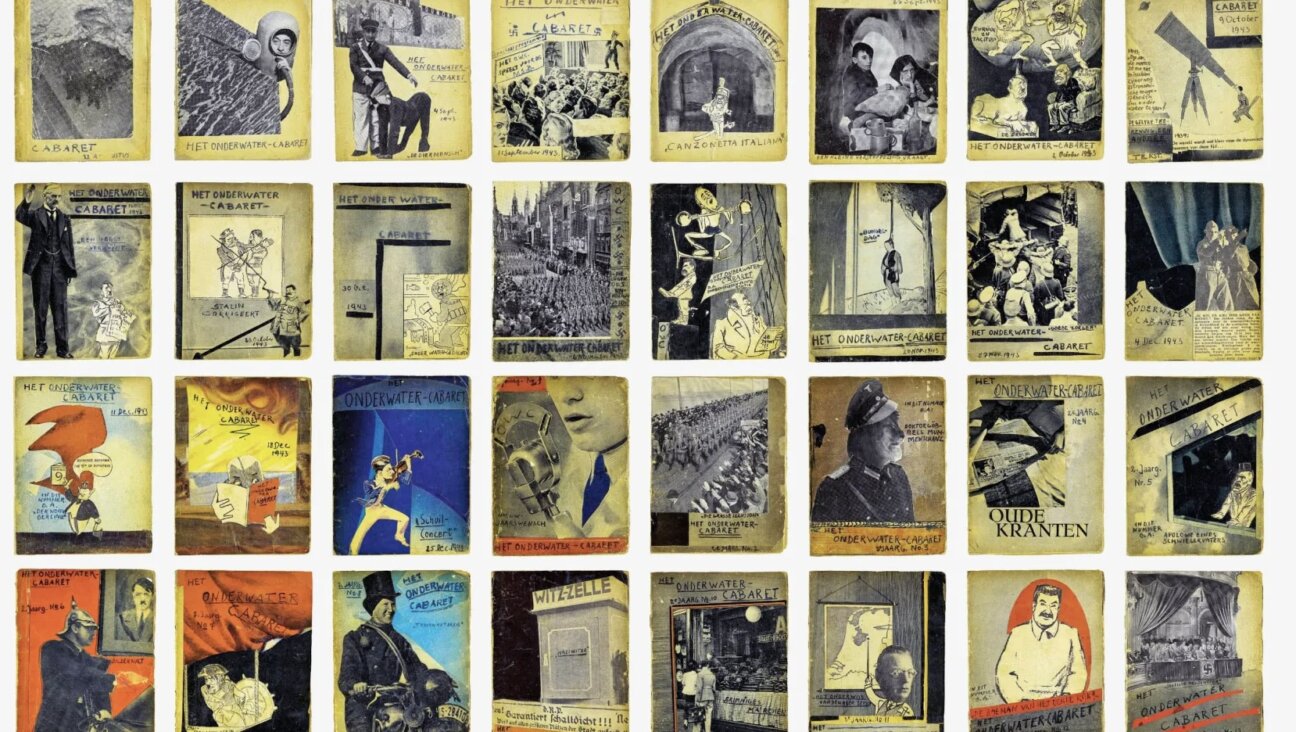City Boy
Leonard Michaels: Collected Stories
Farrar, Straus and Giroux, 403 pages, $26.
Melrose was the last kosher delicatessen in my Brooklyn neighborhood, Brighton Beach. It closed this past spring. Its window was shuttered, and a sign was hung, informing all that the business had moved to the Long Island suburb of Cedarhurst. After 1989, Brighton Beach, once overwhelmingly Jewish, became Semitically émigré with the arrival of many from Moscow, Leningrad and Odessa, and then, as those Russian Jews left for New Jersey and Cedarhurst, it became merely Russian, or Ukrainian, and is now secularly populated with those from variously impoverished “stans” (Kazakh, Uzbek, ad Asian) — the lowliest rung of the Soviet ladder. The kosher food market isn’t what it used to be, apparently, and so Melrose, the overpriced deli with the overpriced name, is finally gone. I was standing on line the last Friday it was open, and the babushka in front of me asked the Hasidic slicer for a pound of pastrami, “lean.” The slicer was familiar, and funny. “There is no such thing as lean pastrami,” he said.
In the weeks following, this line became a Shibboleth, or “Passwoid” — a code for disappointment. My mail was stolen. The post office closed. I couldn’t find my keys. Too bad. “There’s no such thing as a free lunch” — such journalistic adage was aestheticized, made mysticism, as if Hasidic Zen, a koan for us Cohens: “There is no such thing as lean pastrami.” Despite, or in spite — we buy a pound of the fatty stuff, then cope with our happiness however we can.
Finally, the woman who keeps me company on the boardwalk had enough. In front of Coney Island’s famous and infamously defunct Parachute Jump, she asked me what I meant by saying that, where I’d gotten that from and just when did I intend to stop annoying her with it. I told her, over the roar of redevelopment — the batting cages are gone now, the go-cart track has been razed — that it was a line from Leonard Michaels’s great story about stories, “Storytellers, Liars & Bores.” And that I, no liar and I hope no bore, had heard it recently, verbatim, from a Hasid at the deli counter at Melrose. All this happened just as I recount it here, except that I called Leonard Michaels “Lenny.” I am as particular about my writers as that babushka was about her meat — and I am familiar, and protective, too. I called him Lenny; I never even met him.
This story is itself, almost, a Leonard Michaels story. It is both true and, in the very nature of its reference, fictionally generative, significant of a greater presence: These days, Leonard Michaels is everywhere, even more so than in his own lifetime. His few short books have lived, and will continue to live, especially thanks to Farrar, Straus and Giroux’s republication of them this summer. Michaels’s two canonical collections, “Going Places” (1969) and “I Would Have Saved Them If I Could” (1975), supplemented with later offerings, were reissued as “Collected Stories,” along with a memoir of an early
marriage, “Sylvia.” Next year will mark the repackaging and re-release of Michaels’s sole, and controversial, novel, “The Men’s Club” (1981). That book was made controversial only after it was made into a terrible film, featuring performances by Roy Scheider and Frank Langella, alongside a strange turn from Harvey Keitel.
What writing Michaels is known for, and will be known for, has finally been bound together here. The first half of this book, comprising Michaels’s two indisputably masterful collections, is necessary, and its second and newer half is wanting, but taken as a whole, “Collected Stories” is wondrous, mad, instructive and disabusing, and should be widely read.
Reviewing a novel is comparatively simple business. Reviewing a collection of stories, however, too often devolves into an accounting or recounted menagerie of plots, peoples, moods and manners. Another approach is for the reviewer to impose a unifying reading or metaphor upon the totality of a collection’s stories, which might be — and are, in Michaels’s collections — unrelentingly disparate both stylistically and in terms of theme. Michaels especially renders impossibility to difficulty in any relation, or critical translation: His plots come impossible to parse, and resistant to summary. This is because Michaels’s people live in language, in their prose’s tensile rhythms and in such prose’s transmutation into their stories’ jagged forms. Here, concision of experience and concision of syntax are recombinant in an ultimate compression: Michaels’s stories are short, sharp and then over.
This is the first sentence anyone would ever read in a book by Leonard Michaels, from the first collection’s first story, titled “Manikin”: “At the university she met a Turk who studied physics and spoke foreigner’s English which in every turn expressed the unnatural desire to seize idiom and make it speak just for itself.” This “unnatural desire” was to be the seminal instinct of the author himself. Here, Michaels narrates the story of a sexual encounter that is both rape and not rape: both consensual and “con-sensual” — that is, the opposite of erotic, unnatural and without desire. Melanie Green, a Jewish student, is impregnated, seeks an “abortionist” and eventually kills herself by hanging. The discovery of her body by sad Wanda Chung is chilling, both in the event of Melanie’s death and, too, in an incredible transference that is the essence of Michaels’s story-writing power: The reader’s sympathy goes not to Melanie, who is dead, but to Wanda, who is alive, and lonely, a binge eater of candy. By story’s end, the brute image of Melanie’s corpse hanging (“her pelvis twitching”) has almost been forgotten — with any horror at the dead now sublimated into a sorrow, or pity, for not only Wanda the survivor but even for the violating Turk: “When the Turk read about the suicide he said in a slow, sick voice, ‘She loved me.’”
The sex of rape, though, seems less violent than the sex of sex that follows — the congress by Michaels’s recurring Phillip character, a downtown “city boy” (the story’s title is, exactly, “City Boy”), of an uptown and affluent girlfriend. A less spoiled female appears in “The Deal,” in which she’s solicited by a gang of neighborhood children. In “Isaac,” an elderly rabbinic man (it’s never certain if Isaac is, professionally, a rabbi) falls on the pavement, then dies, or nearly dies, after a consultation with a doctor. The title story, “Going Places,” the final piece of the collection, brings us to the heights from which “Murderers,” the first story of the next collection, would fall. Beckman, “a day out of the hospital,” finds himself employment as a painter, working high above the city, which is always New York City, both to earn his living and to recover his masculine strength, or pride. Now that these stories have been recounted, it might be responsible to hazard a totalizing thought: In Michaels’s first collection, sex gives way to love, which leads to abuse of love, then tragedy and then ultimate transcendence — on a metal platform or mental precipice floating high above the urban. This was the skyscraping summit of American Jewish letters, and “Going Places” immediately attracted many fans, much praise.
Leonard Michaels was born on the second day of 1933, and he was always late, and always lean: arriving when the festivities of the American Jewish counterculture were already in full swing, and arriving hungry. Though he certainly drank and smoked and slept around, he was less assimilated than the majority of his peers, and perhaps because of that, he was more attentive to their language: His people were immigrants, and his mother tongue was the mother tongue of all mother tongues, Yiddish; his streets were those of another neighborhood once Jewish and now overwhelmingly not: Manhattan’s Lower East Side.
Michaels would become his own best, if indirect, biographer: “My family came from Poland,” he writes in his story “Murderers,” “then never went any place until they had heart attacks. The consummation of years in one neighborhood: a black Cadillac, corpse inside.” In that story, if not Michaels’s finest then his most famous, four boys, the narrator included, climb a downtown roof, then teeter on a brick ledge, over a far fall to the street. Life, or death, is hazarded only so that the boys can peep, as a neighborhood rabbi has sex with his bewigged wife in an opposite apartment. As this is not autobiography but, instead, a story, a fiction or fictionalization, only disaster can ensue — as does, if unwittingly, a metaphor: Leonard Michaels was always this kid, young, innocent and then again, not so young, and not so innocent, out on the furthest ledge of American prose, religiously peering in on ecstasy, and lust. His hands might be in his pockets, or so his shrug might say in the seductive author photographs featured prominently on the jackets of his books, but all the while he was only making notes.
Further voyeurism, and the exhibition of its erudition, meant school, and Michaels attended, and later taught, many classes, and many female students. His undergraduate education was at New York University, and his graduate work, for the doctorate in English required to earn a living and, with it, an identity beyond his books, was at the University of Michigan. He married a first wife, Sylvia Bloch, a pathologically depressive woman of German Jewish ancestry — a yekke, in its Yiddish term, derisive of a particularly brooding, compulsively obsessive disposition. Sylvia was, apparently, a talented artist, and an incredible pain to live with and to love. She would throw telephones and typewriters; she would spit and yell at Michaels, then lie entire days in bed and cry. When Michaels was contemplating divorce, his father told him he couldn’t abandon her, because she was an orphan. Sylvia, as she is referred to in “Sylvia” (1992), would abandon him, instead, committing suicide and leaving Michaels a young widower, aimless and widely unpublished.
By the time he came to write his account of what it was to be young, newly wed and struggling with money, art and sanity in downtown Manhattan in the early 1960s, Michaels had done all his writing that would last. Then, he was living as a professor at the University of California, Berkeley, and the only significant book ahead of him would be the publication of his diaries, “Time Out of Mind” (1999). A Selected Stories appeared later, “A Girl With a Monkey” (2000), including little and weaker new material. The presses that would publish him became smaller, independent, not-for-profit. Michaels retired to Italy with a new and happy wife, Katharine Ogden, and from there flew back to California to die, from a lymphoma, in 2003. He is survived by a daughter, Louisa, and two sons, Ethan and Jesse, the lattermost famous as the singer of the punk band Operation Ivy.
Next week, Joshua Cohen discusses Michaels’s second collection, “I Would Have Saved Them If I Could,” and why the “Nachman” stories, written late in life and previously unpublished, disappoint in comparison.















